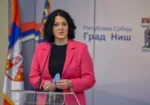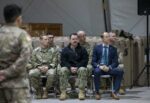The Bosnian journalist, Irmela Shabanovic, on the 29th anniversary of the Srebrenica massacre, said that today’s message is that no child in the world should experience the loss of childhood like she and thousands of other Bosnian children.
“As a 6-year-old child, my childhood was interrupted, my most precious time was stolen with the loss of my father. When we talk about the 29th anniversary, what would be a message is that no other child should ever experience the theft or obstruction of childhood and parental love, that no mother – sister like those of Srebrenica should cry,” he said. that on “RTK Prime”.
Shabanović said that the UN resolution, which declared July 11 the International Day of Remembrance for the Victims of the Srebrenica Genocide, should have been approved earlier.
“Over 8,000 people will not be able to return with this resolution, neither my father nor the fathers nor the sons of the mothers who died there. Justice should have come earlier, but whenever justice knocks on the door, it is not late,” said the Bosnian journalist.
As she spoke about the current situation in the city where more than 8,000 Bosnian men and boys were killed, she said that it has turned into a country with no perspective.
“The life of Srebrenica is dominated by extreme poverty, unemployment, the population is decreasing more and more and in my opinion this is worrying. There is no perspective for the employment of young people”, stated Irmela Shabanović.
On the other hand, the executive director of the International Humanitarian Fund, Bekim Blakaj, said on RTK Prime that he expected greater support during the adoption of the resolution.
“I am surprised by the large number of countries that have abstained. We knew that there will be countries that will vote against, that is, Serbia’s friends. I expected that 90% of the states will support the resolution”, he said.
Activist Redzo Kojiq has said that the first importance of the resolution lies in the content that is specified regarding the commemoration of the genocide.
“The second part is about the individualization of responsibility. This resolution has obliged the states to make organizations for the commemoration of the genocide and for solidarity with them, but in addition to this it has obliged them legally not to take actions that deny this crime”, stated Kojiq.







